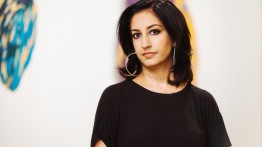Jasbir Puar, "Dividual Economies, Of Data, Of Flesh"
Tuesday, May 3, 2022, 7 - 8:30pm

Jasbir K. Puar gives a free, virtual talk as part of the Spring 2022 Intra-Disciplinary Seminar series exploring the entwined affective and metric economies of dividuals. To explain state violence directed at individuals, there is often recourse to the presumed relay of humanism: the perpetrators dehumanize, or have never humanized, populations of said individuals. Liberal debates about humanizing targets of violence, however, do little to help us comprehend dividuals as units of computational governance. Dividualization does not rehearse the primacy of human forms and in fact exploits humanist attachments to these forms. What is at stake in untangling the workings of the dividual? What is the corporeal in these dividual processes? Following technoscience inquiries but also expanding them to think about how computational governance is both felt and lived, Puar is interested in how dividualization is both digital and of the flesh, involving series of recursive relationalities as well as a way of “unseeing” and re-seeing corporeality.
Paur is professor and graduate director of women’s and gender studies at Rutgers University, where she has been a faculty member since 2000. Her areas of research include critical ethnic studies, cultural studies, feminist globalization studies, immigration and diasporas, queer studies, sexualities studies. Her most recent book is The Right to Maim: Debility, Capacity, Disability (2017) published with Duke University Press in the series ANIMA: Critical Race Studies Otherwise that she co-edits with Mel Chen. Puar’s edited volumes include a special issue of GLQ (“Queer Tourism: Geographies of Globalization”) and co-edited volumes of Society and Space (“Sexuality and Space”), Social Text (“Interspecies”), and Women’s Studies Quarterly (“Viral”). She also writes for The Guardian, Huffington Post, Art India, The Feminist Review, Bully Bloggers, Jadaliyya, and Oh! Industry. Her writings have been translated into Polish, French, German, Croatian, Swedish, Norwegian, Portuguese, Japanese, Korean, Spanish, and Danish.
The IDS public lecture series is part of the Robert Lehman Visiting Artist Program at The Cooper Union. We are grateful for major funding from the Robert Lehman Foundation. The IDS public lecture series is also made possible by generous support from the Open Society Foundations.




